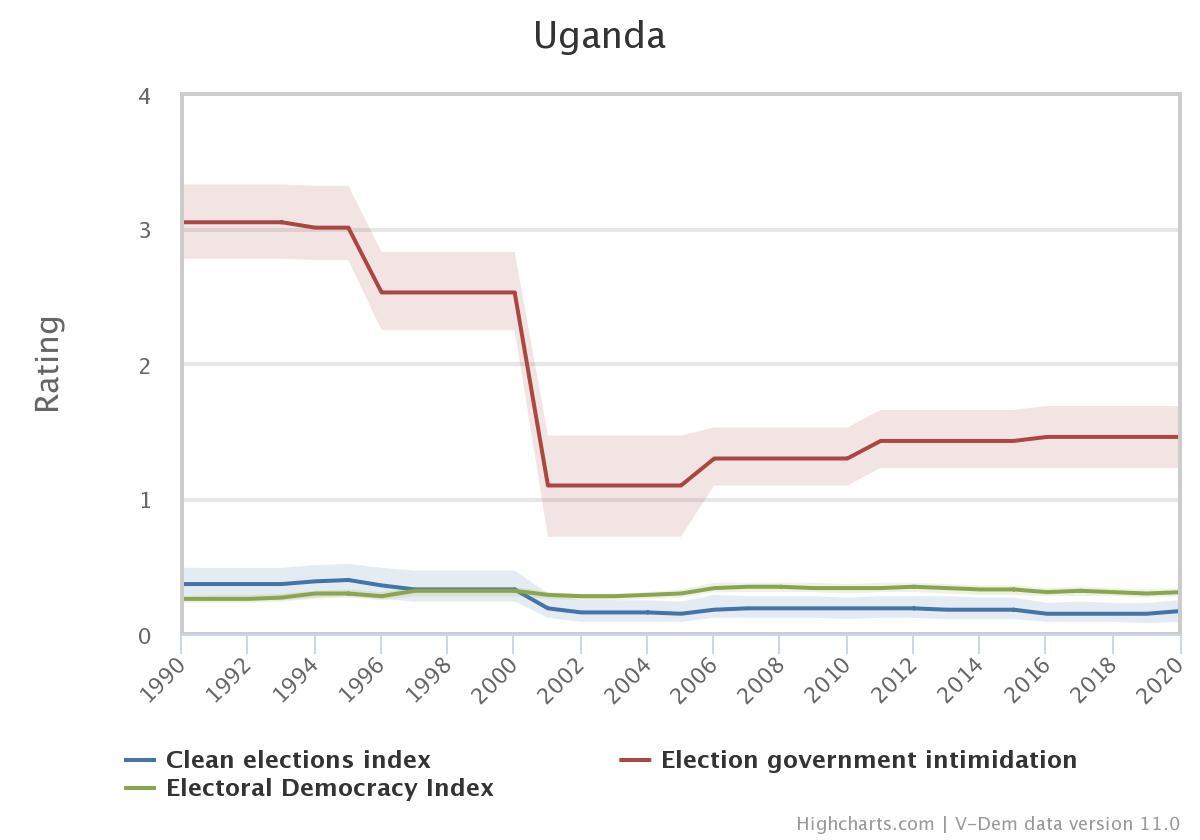35 Years of Museveni: Uganda’s 2021 Election No Break from Character
By: Rowan Cole
Mar 31, 2021
On January 14 2021 Ugandans went to the presidential polls for the sixth time since Yoweri Museveni assumed the country’s highest office, 35 years ago. Museveni was declared the victor with 59% of the vote, while his challenger Bobi Wine (real name Robert Kyagulanyi) took only 35% and declared the election “the most fraudulent […] in the history of Uganda”. However, V-Dem data shows this election was not exceptional.
Although President Museveni took office in 1986, it was not until 1996 that he first held presidential elections. The graph shows that, from 1996, the Clean Elections Index for Uganda—comprised of indicators about electoral management boards, voting irregularities and violence or intimidation—has been consistently in the lower third of the 0-1 range, indicating substantial limitations to clean elections. Similarly, the Electoral Democracy Index which includes variables on political freedoms and suffrage shows only very marginal variation since 1996, and consistently would place Uganda in an “autocratic” bracket or “electoral authoritarianism”.
The 1996 election set a precedent for those to follow, with observers citing irregularities and complaining that Museveni used state resources while forcing opposition candidates to stand independently because of the 1995 constitution’s stipulation of “no-party” presidential elections. The Political Parties and Organizations Act of 2005 restored multipartyism, but allegations of rigging consistently resurface during presidential elections. The partisan nature of Uganda’s electoral commission, headed by Presidential appointees, has been a persistent barrier to clean elections.
Government intimidation during elections has been a major issue in Uganda. Lower values equal higher levels of intimidation, meaning that since a sharp increase in intimidation levels in 2001—and despite improvement at each election year since—values continue to indicate there is systematic, frequent and violent harassment and intimidation of the opposition by the government. The slight decreases in levels of intimidation from 2006 onwards might be attributed to greater international scrutiny of Ugandan presidential elections.
However, the election campaigns of 2006, 2011 and 2016 were still all characterized by intimidation and violence against, and detention of, opposition parties by state security agencies. For example, the 2006 political arrests of leading opposition candidate Dr. Kizza Besigye were characterized by Human Rights Watch as the government’s “most notorious attempt” to intimidate rivals. Clear parallels are visible in the arrest of Bobi Wine on grounds of breaching Covid-19 regulations in 2020. Furthermore, state security force violence against opposition politicians and supporters has been a common feature of Ugandan election campaigns. Wine, and his supporters were victims – 54 were shot dead by police while protesting Wine’s arrest.
The international community’s expressions of surprise over 2021 Ugandan abuses demonstrate an amnesia for the 35 years of the Museveni presidency and the character of his five prior presidential re-elections. Should Museveni be able to stand again in 2026, aged 80, prior form suggests any election will be far from free and fair.


